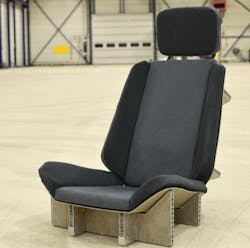There is a growing global problem with waste. Simply put, people have become active consumers without fully embracing the idea of using and reusing materials throughout the feasible lifecycle. Far too many products have become consumables in today's fast paced environment. People collectively produce 2.1 billion tons of waste per year. In order to demonstrate the feasibility of reusing this waste, a TU/ecomotive student team created a car made almost entirely out of recycled material. The result is a sporty-looking EV called Luca with a base of flax and recycled plastic, a large part of which was even fished out of the ocean. The body, finish, windows and interior are also made of recycled materials, including PET bottles, the hard plastic ABS and household waste.
Built with two electric motors in the rear wheels, Luca can reach a top speed of 90 kilometers per hour and has an action radius of 220 kilometers. The consumption can be converted to about 180 kilometers per liter of gasoline. In addition to the efficient engines, this is due to the low weight: the car weighs only 360 kg without batteries. This is over half as light as comparable cars. In addition, the car only needs sixty kilos of batteries as opposed to hundreds of kilos for other EVs.
Industry partners
Thermoplastic honeycomb core producer EconCore served as a major partner in the project. According to Wouter Winant, technical manager at EconCore, “We’ve been involved with this project for the last four years now and each year our involvement has increased. We’re delighted to be supporting the TU/ecomotive team as we share similar values in terms of using technology to produce sustainable products and minimise waste. Through innovation, we can create much more sustainable solutions and the Luca car project demonstrates that in such a clever way.”
More than 20m² of recycled PET honeycomb cores supplied by EconCore was used by the TU/ecomotive team in the design of LUCA. The whole chassis was made using the honeycomb core material, along with other areas such as the seat support structure, parts of the dashboard and the battery housing. After lamination of the composite skins, the strong, lightweight panels were used in most of the structural parts of the car. In addition to supplying the material, EconCore also provided extensive technical advice and consulting services.“The team asked for specific data and advice on how to optimally design and use the panels. We carried out tensile tests on the composite materials and three-point bending tests on small panel samples, with different core thicknesses and skin materials,” said Winant. “The mechanical data from these tests provided the optimum design of sandwich panel with the right balance between sustainability, weight, strength and stiffness.”
One of the challenges the TU/ecomotive team had was gluing the recycled PET core to a composite sheet consisting of flax fibers and a recycled Polyolefin matrix contributed by other partners. These two materials do not work well together when using adhesive.
Technical advice was provided by EconCore to overcome this problem. A polyester non-woven fleece was used to cover the surface area of the honeycomb core. This is compatible with the adhesive and composite skin layers. A thin PET barrier film was used to ensure the adhesive glue did not flow through the fleece into the honeycomb cells, keeping the panel lightweight. All the materials were made of recycled PET, maintaining the aim of using recycled materials in a circular economy.
“What’s apparent to us, now the project is complete, is how the Luca car demonstrates just how versatile the recycled PET honeycomb core panels are, with the potential range of applications it can be used for,” he said. “Not just in automotive terms but in other industrial and consumer applications where strength, rigidity and light-weight are such important characteristics. The potential is huge.”
“With this car, we want to show that waste is a valuable material, even in complex applications like a car,” says team member Matthijs van Wijk. “Through this, the team hopes to make people aware of their consumption behavior and thus contribute to the development of a circular economy.
About the Author
Peter Fretty
Technology Editor
As a highly experienced journalist, Peter Fretty regularly covers advances in manufacturing, information technology, and software. He has written thousands of feature articles, cover stories, and white papers for an assortment of trade journals, business publications, and consumer magazines.


